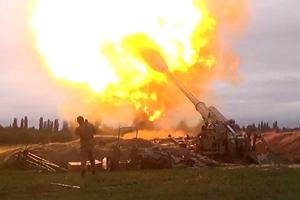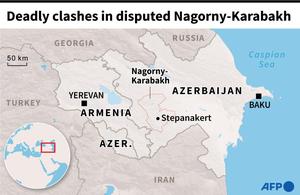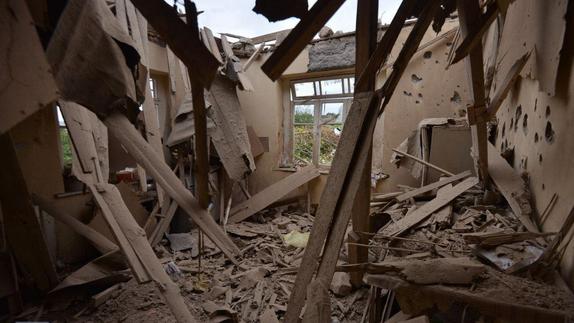 An image grab taken from a video made available on the official web site of the Azerbaijani Defence Ministry on Sept 28, 2020, allegedly shows Azeri artillery strike towards the positions of Armenian separatists in the breakaway region of Nagorno-Karabakh. (PHOTO / AFP)
An image grab taken from a video made available on the official web site of the Azerbaijani Defence Ministry on Sept 28, 2020, allegedly shows Azeri artillery strike towards the positions of Armenian separatists in the breakaway region of Nagorno-Karabakh. (PHOTO / AFP)
BAKU/YEREVAN - Armenia and Azerbaijan accused each other on Tuesday of firing directly into each other’s territory beyond the Nagorno-Karabakh conflict zone, as the worst spate of fighting since the 1990s raged for a third day and the civilian death toll mounted.
Dozens have been reported killed and hundreds wounded since the fierce clashes between Azerbaijan and its ethnic Armenian mountain enclave of Nagorno-Karabakh broke out on Sunday in a new eruption of a decades-old conflict.
Dozens have been reported killed and hundreds wounded since the fierce clashes between Azerbaijan and its ethnic Armenian mountain enclave of Nagorno-Karabakh broke out on Sunday in a new eruption of a decades-old conflict
In a sign that fighting was spreading, Armenia’s foreign ministry reported the first death in Armenia proper - a civilian it said was killed in an Azeri attack in the town of Vardenis more than 20 km (12 miles) from Nagorno-Karabakh.
The Armenian defence ministry said an Armenian civilian bus caught fire in the town after being hit by an Azeri drone. It was not clear if the reported civilian death was from that incident.
Azerbaijan’s President Ilham Aliyev said 10 civilians had been killed by Armenian shelling since Sunday. There was no official information about casualties among Azeri servicemen.
Nagorno-Karabakh is a breakaway region that is inside Azerbaijan but is run by ethnic Armenians and is supported by Armenia. It broke away from Azerbaijan in a war in the 1990s, but is not recognised by any country as an independent republic.
“This is a life-and-death war,” Arayik Harutyunyan, the Nagorno-Karabakh leader, told a briefing.
READ MORE: Armenia, Azerbaijan step up fighting in fiercest clashes since 1990s
Any move to all-out war could drag in major regional powers Russia and Turkey. Moscow has a defence alliance with Armenia, which provides vital support to the enclave and is its lifeline to the outside world, while Ankara backs its ethnic Turkic kin in Azerbaijan.
The Kremlin said Moscow was in constant contact with Turkey, Armenia and Azerbaijan over the conflict. Any talk of providing military support for the opposing sides would only add fuel to the fire, it said.
“We haven’t seen anything like this since the ceasefire to the war in the 1990s. The fighting is taking place along all sections of the front line,” said Olesya Vartanyan, senior analyst for the South Caucasus region at Crisis Group.
German Chancellor Angela Merkel called for an immediate ceasefire and de-escalation of the conflict between Azerbaijan and Armenia in phone calls with the countries’ leaders, government spokesman Steffen Seiber said on Tuesday.
Russia called for an immediate ceasefire, and Turkey said it would support Azerbaijan.
COUNTER-ATTACKS
The Armenian defence ministry said in a statement that Azeri armed forces opened fire on a military unit in Vardenis, but that the border with Nakhchivan, an autonomous republic inside Azerbaijan, was less tense.

Azerbaijan’s defence ministry said that from Vardenis the Armenian army had shelled the Dashkesan region inside Azerbaijan. Armenia denied those reports.
Azerbaijan on Sunday reported the death of five members of a single family. Armenia said on Tuesday that a 9-year-old girl was killed in shelling, while her mother and a brother were wounded.
A mother and her child were killed in Martuni on Sunday, the defence ministry of Nagorno-Karabakh said.
The clashes have reignited concern over stability in the South Caucasus region, a corridor for pipelines carrying oil and gas to world markets.
Armenia is considering the possibility of concluding a military-political alliance with Nagorno-Karabakh, Lilit Makunts, an MP from the ruling My Step alliance, wrote on her Facebook page.
ALSO READ: Death toll rises in Azerbaijan-Armenia border clashes
Azerbaijan’s defence ministry said both sides had attempted to recover lost ground by launching counter-attacks in the directions of Fizuli, Jabrayil, Agdere and Terter - Armenian-occupied areas of Azerbaijan that border Nagorno-Karabakh.
Armenia reported fighting throughout the night, and said that Nagorno-Karabakh’s army had repelled attacks in several directions along the line of contact.
Azerbaijan declared a partial military mobilisation on Monday after declaring martial law on Sunday. Armenia and Nagorno-Karabakh declared martial law and mobilised their male populations on Sunday. Men older than 18 years in Armenia are banned from leaving the country.
Clashes first broke out in the late 1980s between Nagorno-Karabakh’s Armenian Christian majority and their ethnic Azeri neighbours, as Soviet Communist rule from Moscow was starting to crumble.
All-out war in the early 1990s led to hundreds of thousands of Azeris being driven out as the region, with heavy support from Armenia, threw off control from Baku and became self-governing. Hundreds of thousands more Armenians and Azeris were displaced from Azerbaijan and Armenia respectively.
The new fighting has revived concern over stability in the South Caucasus, a corridor for pipelines carrying oil and gas to world markets
Angela Frangyan, a filmmaker in the Nagorno-Karabakh capital, Stepanakert, said residents had taken cover in bomb shelters and that constant shelling could be heard. All shops were closed and hardly anyone was in the streets.
Turkish President Tayyip Erdogan demanded Armenia immediately quit the Azeri lands he said it was occupying and said it was time to end the Nagorno-Karabakh crisis.
British Prime Minister Boris Johnson discussed the surge in violence with Erdogan in a call on Monday. Johnson’s office said that Britain was calling for urgent de-escalation in Nagorno-Karabakh.
The UK, Belgium, Estonia, France and Germany plan to raise the conflict for discussion behind closed doors at the United Nations Security Council on Tuesday, diplomats said.
 A view of a house which is said was damaged in recent shelling during clashes between Armenian separatists and Azerbaijan over the breakaway Nagorny Karabakh region, in Nagorno-Karabakh's city of Martuni on Sept 28, 2020. (PHOTO / AFP)
A view of a house which is said was damaged in recent shelling during clashes between Armenian separatists and Azerbaijan over the breakaway Nagorny Karabakh region, in Nagorno-Karabakh's city of Martuni on Sept 28, 2020. (PHOTO / AFP)
TURKISH SUPPORT
Armenia’s parliament condemned what it said was a “full-scale military attack” by Azerbaijan on Nagorno-Karabakh.
Armenia’s parliament condemned what it said was a “full-scale military attack” by Azerbaijan on Nagorno-Karabakh
Armenian foreign ministry spokeswoman Anna Naghdalyan said Turkish military experts were fighting alongside Azerbaijan, and that Turkey had provided drones and warplanes. Azerbaijan denied the allegations, and there was no immediate reaction from Turkey.
But senior officials including Erdogan, who has increasingly been flexing Turkey’s military muscle abroad, have promised support for Baku.
Interfax news agency quoted the press secretary of Azerbaijan’s defence ministry, Anar Evyazov, as saying the Azeri military had occupied several strategically important heights near the village of Talish in Nagorno-Karabakh.
Evyazov also said Lernik Vardanyan, commander of the Armenian airborne assault battalion, had been killed near Talish. Armenia said that was disinformation.
Two Syrian rebels from Turkish-backed groups in areas of northern Syria under Turkish control told Reuters last week that they were being sent as part of a contingent to help Azerbaijan, in coordination with Ankara.
Reuters could not independently verify their accounts.
Hikmat Hajiyev, an aide to Azeri President Aliyev, said it was nonsense to say Syrian fighters were helping his country.


